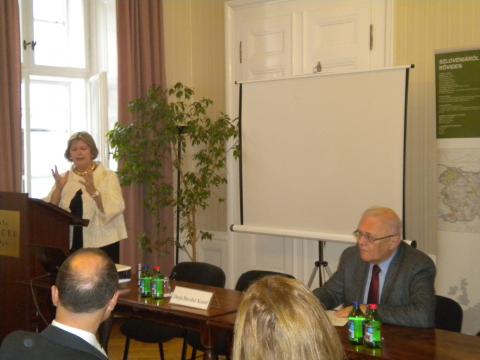Event Report: “Ljubljana and Budapest – a Slovenian Take on Bilateral Relations”

On the 20th of November, the Center for European Enlargement Studies, with the support of the Friedrich Ebert Stiftung Budapest, organized the second lecture of its newly launched series entitled “The Seven Neighbors of Hungary- Questions of Historical Reconciliation and Cooperation in the 21st Century”. The lecture series is intended to treat critically the topic of diplomatic and historical reconciliation of Hungary with its seven neighbors. The conferences bring together diplomats, academic expertise, and views from young scholars from the area.
The second event of the series, dedicated to the bilateral relations of Slovenia and Hungary, hosted Her Excellency, Darja Bavdaž Kuret, Ambassador of Slovenia to Hungary. The lecture was opened by CENS Director, Péter Balázs, who highlighted the importance of historical reconciliation – an issue where the EU sets very high standards, but provides low direct support. This is the context where the countries need to find a way to overcome their historical grievances, and learning from good examples of others, build good cooperation in their neighborhood.
After Professor Balázs’ introduction, Ambassador Bavdaž Kuret took the floor, giving a general overview about the development of Slovenian diplomatic relations after the country’s secession from Yugoslavia. She voiced that even though official visits are regular and frequent, and diplomatic relations exist between Slovenia and Hungary since January 1992, Hungary is still the least visible neighbor of Slovenia.
During the Communist era, the Iron Curtain raised a wall between Hungary and Slovenia as part of the Yugoslavian Federation. The two countries only slowly started to discover each other politically, economically and culturally starting in the 1990s. Moreover, unlike in the case of its other neighbors, a language barrier does exist between Slovenia and Hungary. The EU membership, however, grants the countries great opportunities and instruments to overcome this obstacle. Here the Ambassador pointed to the available EU funds for the protection and promotion of small languages.
Discussing the foreign policy goals of the two countries, Ambassador Bavdaž Kuret pointed out their common interests in the past (e.g. EU and NATO integration), and looked also at the future. Even though we have been preoccupied with our own development until now, we need to build our relations on the new geostrategic position we find ourselves in – said the Ambassador. The development of the relations is to be based on two main strategic elements: transport (the 5th corridor) and energy. Additionally, cooperation in the Central European basin is increasingly important for Slovenia. The country is keen to have strong relations with the Visegrad Group, which it considers its natural partner for cooperation.
Ambassador Bavdaž Kuret’s intervention was followed by questions from the audience, which treated the topics of regional cooperation within the Western Balkans, the Visegrad Group and the possibility to transfer good practices of cross-border cooperation between Slovenia and its neighbors to other regions. Professor Balázs’ concluding remarks emphasized the good nature of the Slovenian-Hungarian relations which are free from the burden of historical conflicts – a real exception in the region. Having such relations, the countries have a good background to turn towards each other and face the common challenges of the future in the European Union: the EU’s enlargement, the Euro crisis and the development of the multiannual financial framework.
